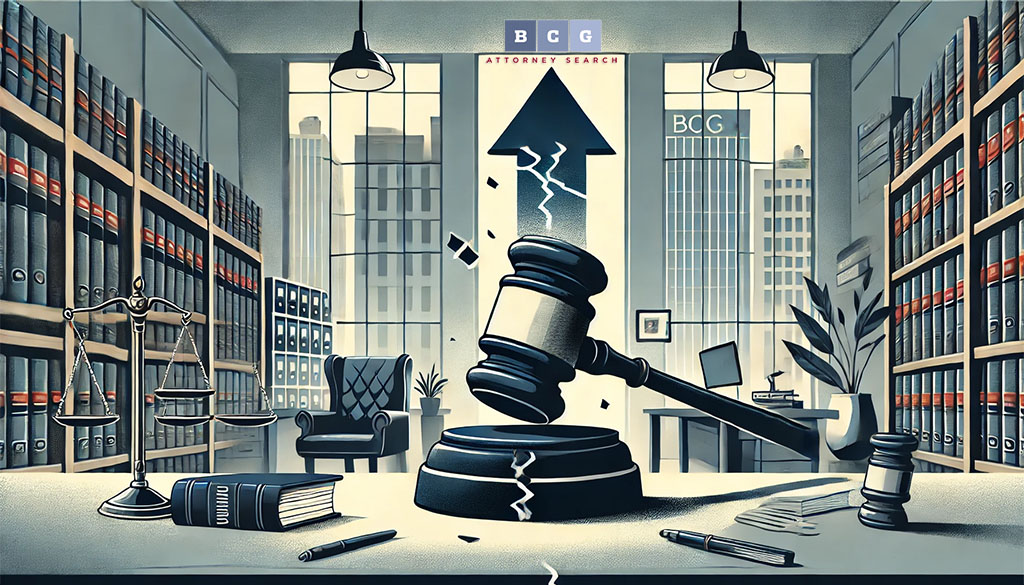
The Legal Job Market’s Cyclical Nature
The legal job market is far from static; it ebbs and flows with economic conditions. When the economy is booming, firms expand, and hiring increases across many practice areas, especially in corporate law, real estate, and mergers & acquisitions. However, during economic downturns, even the most qualified attorneys may struggle to find work.
Take, for example, the current state of the economy. We are seeing ripple effects like never before. Large corporations are cutting back on outside counsel, and real estate practices are faltering as demand dries up. Warehouses sit empty, and credit card default rates are rising. These economic trends directly impact law firms, which in turn reduce their hiring. Even if you have stellar credentials, you may be facing rejection not because of your skills but because there are simply fewer opportunities.
- If rejection leaves you wondering whether you’ve applied to too few—or too many—firms, How Many Firms and Jobs Should I Apply To? When Is Enough Enough? offers practical answers.
Let’s look at the real estate sector. Just a few years ago, law firms had lines of clients needing real estate counsel. But today, many real estate attorneys are losing their jobs or struggling to find new ones. The market has shifted, and firms are not bringing in the work they once did. You could be the best attorney in the field, but if the practice area itself is shrinking, you’ll face significant hurdles.
Why Law Firms Reject Attorneys
1. You Aren’t Applying to Enough Firms
One of the biggest mistakes attorneys make is not casting a wide enough net. The legal market is enormous, with thousands of law firms across different sizes, locations, and specialties. However, many attorneys limit themselves by only applying to a few firms in their local market or focusing exclusively on large, prestigious firms. This narrow approach dramatically reduces your chances of success.
Consider the example of rural law firms. Many small-town firms have openings that go unfilled for months because most attorneys focus their job searches on big cities. For example, rural towns in places like Montana or North Dakota often have a dire need for attorneys, yet few apply because they don’t want to relocate. In one case, a candidate in my firm was a corporate attorney in New York who couldn’t find work for six months. When she expanded her search to smaller markets, she received several offers from firms in smaller cities that were eager to hire her.
Even if you have an impressive resume, limiting your search to just a few firms, especially in major metropolitan areas, is a recipe for rejection. The broader your search, the better your chances of finding a firm that is actively hiring and willing to consider your application. Interestingly, attorneys themselves often turn away from firms; see Top Ten Reasons Attorneys Do Not Approve Firms for insights into candidate-side decision-making. To strengthen resilience and avoid common pitfalls, watch our video: How to Not Fail, Die or Go Crazy Practicing Law.
- Understanding why attorneys may hesitate to approve firms can add perspective—see our guide on Top Ten Reasons Attorneys Do Not Approve Firms for more insights.
2. You Are Facing Stiff Competition
Another reason attorneys are rejected is simply the level of competition. For every job opening at a prestigious firm, there are often dozens—if not hundreds—of highly qualified applicants. When law firms post openings, especially in major markets, they are inundated with applications. Only a select few will make it to the interview stage. These challenges are compounded by systematic reasons many attorneys fail in large firms, which go beyond individual performance.
- Seeing how attorneys succeed despite barriers can be inspiring—Discovering Munger, Tolles & Olson LLP: Your Gateway to a Rewarding Legal Career provides examples of successful entry into a competitive firm.
For example, law firms like Cooley LLP in Silicon Valley might receive 50 or more applications for a single litigator position. Even if you’re a strong candidate, you may not be the top choice among such a competitive field. In these situations, you are competing with attorneys from top law schools, with impeccable credentials, and often with more relevant local experience. To dig deeper, review the top reasons attorneys don’t get law firm interviews for more insight into early rejection patterns.
However, smaller markets often face less competition. A candidate who struggled to get interviews in Washington D.C. may find themselves in demand in cities like Richmond or Baltimore, where there are fewer applicants vying for the same positions. One particular attorney I worked with applied to 15 large law firms in Los Angeles and didn’t get a single interview. When he came to me, I suggested we broaden his search. We focused on smaller firms and secondary markets, and he ended up securing multiple interviews and job offers.
- Part of thriving in law is avoiding self-sabotage—review the 5 toxic behaviors attorneys should eliminate.
See Related Articles:
- The Art of Interviewing: Tips for Converting Interviews into Offers
- The Best Interview Tips For Your Law Firm Interview
- Off-the-Record Interview Tips from Law Firm Interviewers
3. Your Resume Isn’t Selling You Properly
Your resume is your primary marketing tool, and if it doesn’t properly showcase your skills and experience, you’ll be rejected before a firm even gets to know you. One of the most common mistakes attorneys make is sending out a generic resume that doesn’t speak to the specific job they’re applying for. Worse, some resumes include irrelevant or damaging information.
For instance, I once saw a resume from a candidate who went to a top Ivy League law school but mentioned his personal views on sexuality over 17 times on a single page. Regardless of his qualifications, that resume raised red flags. Law firms, particularly in competitive markets, don’t want to hire someone who may bring controversial views into the workplace or alienate potential clients.
Another common mistake is listing too many practice areas or unrelated skills. Firms are not looking for generalists. If you’re applying for a position as a litigator, your resume should focus on your litigation experience—not on other practice areas you’ve dabbled in.
It’s essential to tailor your resume for each application. Remove irrelevant details and focus on the skills and experience that match the job posting. For example, if a firm is hiring for a securities attorney, highlight your work in that area, not your real estate experience. Spending time refining your resume can make the difference between getting rejected outright or landing an interview.
4. You’re Targeting the Wrong Market
Another reason for rejection is targeting a market that doesn’t have a demand for your practice area. The legal job market is not uniform—different cities and regions have different needs, and practice areas fluctuate in demand depending on the economic climate.
For instance, when the real estate market is booming, law firms can’t hire real estate attorneys fast enough. But when the market slows, real estate lawyers can find themselves without work for months on end. I once worked with a real estate attorney in California who was incredibly talented but couldn’t find work because the market had dried up. She eventually found success by applying to firms in Nevada, where the demand for real estate attorneys was still high.
In another example, a bankruptcy attorney may find themselves in high demand during a recession, while a corporate M&A lawyer struggles to find work. It’s crucial to assess the market demand for your practice area. Equally important is avoiding the career pitfalls of choosing the wrong law firm, which can derail even a strong career path. If your area is currently slow, you may need to pivot to a related practice or expand your job search to other geographic areas where demand is higher..
5. Law Firms May Have Other Factors at Play
Law firms make hiring decisions based on factors beyond your qualifications. Sometimes, internal dynamics within the firm can affect whether or not you get hired. For example, I once worked with a candidate who was a senior attorney in a niche corporate area. He had a strong background, but during his job search, he was repeatedly rejected, despite getting interviews.
In one instance, he traveled from Washington, D.C., to New York City for an interview, only to be kept waiting in the lobby for over an hour. Eventually, the firm informed him that they couldn’t interview him that day due to a last-minute change. Despite their polite explanation, they never rescheduled the interview, leaving him in limbo. This experience wasn’t a reflection of his skills—it was simply a matter of bad timing and internal politics at the firm. He eventually landed a job at a small law firm in Boston, but it took six months of persistent searching.
Another example is the case of an attorney I worked with who was told she would receive an offer from a major firm in California. She was excited and even started preparing to quit her current job. But at the last minute, the firm changed its mind, citing salary concerns. Despite being assured she was the top candidate, the firm decided they couldn’t afford her. These types of rejections can feel personal, but they often have nothing to do with you as a candidate. Attorneys also face systemic pressures outlined in The Seven Deadly Burdens of Being a Law Firm Attorney, which can shape their experience beyond individual control.
- If traditional firm routes are challenging, alternative strategies can provide a lifeline—see Breaking Away from BigLaw: Career Strategies in Tough Times for guidance.
How to Overcome Rejection and Find Success
1. Increase Your Application Pool
The first and most straightforward way to overcome rejection is to apply to more places. As I’ve mentioned, the legal job market is vast. There are thousands of firms across the country, and each one has its unique hiring needs. If you’re only applying to a few, especially in highly competitive markets, you’re dramatically reducing your chances of success.
- Much of this rejection process also weighs heavily on recruiters, who face silent struggles in advocating for candidates under firm pressures.
One of the most successful attorneys I’ve worked with applied to over 400 firms before landing his position. He wasn’t the top candidate in terms of qualifications, but his persistence paid off. By applying to as many firms as possible, he found one that was the right fit for his experience and skill set.
- Our Baker & Hostetler employment insights article demonstrates how these barriers manifest at one of the nation’s leading firms.
2. Focus on Unadvertised Jobs
Many of the best opportunities are never advertised publicly. Law firms often fill positions through internal referrals or by relying on recruiters. By focusing on unadvertised jobs, you can reduce the level of competition. Services like LawCrossing specialize in finding these hidden opportunities.
For example, one of my candidates was a mid-level corporate attorney in Detroit. He struggled to find advertised positions but eventually secured a role through an unadvertised opening that was only posted on a law firm’s internal website. He was the only candidate, and the firm was eager to hire someone with his experience. Many attorneys face these hurdles, but strategies outlined in Top Ten Reasons Attorneys Don’t Approve Firms — and How BCG Turns ‘Maybe Later’ into Offers Now can help turn rejections into opportunities.
- Candidates who align with supportive environments like Baker Donelson, which prioritizes empowering success, often avoid many of the pitfalls leading to rejection.
3. Tailor Your Resume for Each Application
Your resume should be specific to the job you are applying for. It’s not enough to have a “one-size-fits-all” resume. Take the time to revise your resume to match each job posting. Remove irrelevant experience and highlight the skills and practice areas that the firm is looking for.
I often advise my clients to seek professional help with their resumes. Having an outside perspective can make a huge difference. A polished, tailored resume is often the key to getting through the initial screening process and landing an interview. For more practical insights, check this Q&A on overcoming rejections and setting goals.
See Related Articles:
- A Resume Must Tell the Whole Story
- What Should I Put on My Attorney Resume?
- 6 Things Attorneys and Law Students Need to Remove from Their Resumes ASAP If They Want to Get Jobs with the Most Prestigious Law Firms
4. Persistence Is Key
Rejection is part of the process. Even the most qualified candidates face rejection, and often for reasons that are beyond their control. Building resilience is critical, as outlined in Thriving in Law Firms: Overcoming Rejection and Building Resilience. The key is to persist. Keep applying, keep refining your approach, and don’t give up. Many attorneys have transformed rejection into opportunity—explore Turning Setbacks into Success for inspiration.
- Understanding rejection is critical, but so is developing a roadmap forward. Learn more in our feature on navigating the job search maze for senior attorneys.
5. Be Open to Geographic Flexibility
Sometimes, the market you’re targeting is simply too saturated. Being willing to relocate or apply to firms in other regions can open up new opportunities. Smaller markets often have less competition, and firms in these areas may be more eager to hire candidates with your experience. To understand the full context behind these rejection decisions, watch this video on the 12 critical factors law firms consider.
In one example, a candidate of mine broadened her search from Chicago to smaller markets in the Midwest and received multiple job offers. Sometimes, the best opportunities aren’t where you expect them to be.
- For more in-depth advice on navigating challenges and rejections in your legal career, check out Legal Career Q&A: In-Depth Advice for Attorneys Navigating Challenges and Rejection.
Conclusion
Rejection is a natural part of the legal job search process. By understanding why law firms reject candidates and implementing strategies to overcome these challenges, you can significantly improve your chances of success. Whether it’s broadening your search, tailoring your resume, or focusing on unadvertised jobs, each step you take brings you closer to finding the right position. Candidates can also watch this video on addressing career pivots and frequent moves to understand how to reverse potential red flags.
- To avoid common pitfalls while selecting a firm and location, see How to Choose the Right Law Firm and Geographic Area for Your Legal Career.
Stay persistent, stay flexible, and most importantly, stay focused. Success often comes to those who are willing to adapt and push through the obstacles. By embracing these strategies, you’ll be better positioned to overcome rejection and secure the legal job you’ve been striving for. For additional actionable strategies, see Mastering the Legal Job Market: Overcoming the Top Reasons for Attorney Rejection.
- For a deeper dive into overcoming attorney rejections in the job market, check out Mastering the Legal Job Market: Overcoming the Top Reasons for Attorney Rejection, which offers actionable strategies for success.
About Harrison Barnes
No legal recruiter in the United States has placed more attorneys at top law firms across every practice area than Harrison Barnes. His unmatched expertise, industry connections, and proven placement strategies have made him the most influential legal career advisor for attorneys seeking success in Big Law, elite boutiques, mid-sized firms, small firms, firms in the largest and smallest markets, and in over 350 separate practice areas.
A Reach Unlike Any Other Legal Recruiter
Most legal recruiters focus only on placing attorneys in large markets or specific practice areas, but Harrison places attorneys at all levels, in all practice areas, and in all locations-from the most prestigious firms in New York, Los Angeles, and Washington, D.C., to small and mid-sized firms in rural markets. Every week, he successfully places attorneys not only in high-demand practice areas like corporate and litigation but also in niche and less commonly recruited areas such as:
- Immigration Law
- Workers Compensation
- Insurance
- Family Law
- Trust and Estate
- Municipal law
- And many more...
This breadth of placements is unheard of in the legal recruiting industry and is a testament to his extraordinary ability to connect attorneys with the right firms, regardless of market size or practice area.
Proven Success at All Levels
With over 25 years of experience, Harrison has successfully placed attorneys at over 1,000 law firms, including:
- Top Am Law 100 firms such including Sullivan and Cromwell, and almost every AmLaw 100 and AmLaw 200 law firm.
- Elite boutique firms with specialized practices
- Mid-sized firms looking to expand their practice areas
- Growing firms in small and rural markets
He has also placed hundreds of law firm partners and has worked on firm and practice area mergers, helping law firms strategically grow their teams.
Unmatched Commitment to Attorney Success - The Story of BCG Attorney Search
Harrison Barnes is not just the most effective legal recruiter in the country, he is also the founder of BCG Attorney Search, a recruiting powerhouse that has helped thousands of attorneys transform their careers. His vision for BCG goes beyond just job placement; it is built on a mission to provide attorneys with opportunities they would never have access to otherwise. Unlike traditional recruiting firms, BCG Attorney Search operates as a career partner, not just a placement service. The firm's unparalleled resources, including a team of over 150 employees, enable it to offer customized job searches, direct outreach to firms, and market intelligence that no other legal recruiting service provides. Attorneys working with Harrison and BCG gain access to hidden opportunities, real-time insights on firm hiring trends, and guidance from a team that truly understands the legal market. You can read more about how BCG Attorney Search revolutionizes legal recruiting here: The Story of BCG Attorney Search and What We Do for You.
The Most Trusted Career Advisor for Attorneys
Harrison's legal career insights are the most widely followed in the profession.
- His articles on BCG Search alone are read by over 150,000 attorneys per month, making his guidance the most sought-after in the legal field. Read his latest insights here.
- He has conducted hundreds of hours of career development webinars, available here: Harrison Barnes Webinar Replays.
- His placement success is unmatched-see examples here: Harrison Barnes' Attorney Placements.
- He has created numerous comprehensive career development courses, including BigLaw Breakthrough, designed to help attorneys land positions at elite law firms.
Submit Your Resume to Work with Harrison Barnes
If you are serious about advancing your legal career and want access to the most sought-after law firm opportunities, Harrison Barnes is the most powerful recruiter to have on your side.
Submit your resume today to start working with him: Submit Resume Here
With an unmatched track record of success, a vast team of over 150 dedicated employees, and a reach into every market and practice area, Harrison Barnes is the recruiter who makes career transformations happen and has the talent and resources behind him to make this happen.
A Relentless Commitment to Attorney Success
Unlike most recruiters who work with only a narrow subset of attorneys, Harrison Barnes works with lawyers at all stages of their careers, from junior associates to senior partners, in every practice area imaginable. His placements are not limited to only those with "elite" credentials-he has helped thousands of attorneys, including those who thought it was impossible to move firms, find their next great opportunity.
Harrison's work is backed by a team of over 150 professionals who work around the clock to uncover hidden job opportunities at law firms across the country. His team:
- Finds and creates job openings that aren't publicly listed, giving attorneys access to exclusive opportunities.
- Works closely with candidates to ensure their resumes and applications stand out.
- Provides ongoing guidance and career coaching to help attorneys navigate interviews, negotiations, and transitions successfully.
This level of dedicated support is unmatched in the legal recruiting industry.
A Legal Recruiter Who Changes Lives
Harrison believes that every attorney-no matter their background, law school, or previous experience-has the potential to find success in the right law firm environment. Many attorneys come to him feeling stuck in their careers, underpaid, or unsure of their next steps. Through his unique ability to identify the right opportunities, he helps attorneys transform their careers in ways they never thought possible.
He has worked with:
- Attorneys making below-market salaries who went on to double or triple their earnings at new firms.
- Senior attorneys who believed they were "too experienced" to make a move and found better roles with firms eager for their expertise.
- Attorneys in small or remote markets who assumed they had no options-only to be placed at strong firms they never knew existed.
- Partners looking for a better platform or more autonomy who successfully transitioned to firms where they could grow their practice.
For attorneys who think their options are limited, Harrison Barnes has proven time and time again that opportunities exist-often in places they never expected.
Submit Your Resume Today - Start Your Career Transformation
If you want to explore new career opportunities, Harrison Barnes and BCG Attorney Search are your best resources. Whether you are looking for a BigLaw position, a boutique firm, or a move to a better work environment, Harrison's expertise will help you take control of your future.
Submit Your Resume Here to get started with Harrison Barnes today.
Harrison's reach, experience, and proven results make him the best legal recruiter in the industry. Don't settle for an average recruiter-work with the one who has changed the careers of thousands of attorneys and can do the same for you.
About BCG Attorney Search
BCG Attorney Search matches attorneys and law firms with unparalleled expertise and drive, while achieving results. Known globally for its success in locating and placing attorneys in law firms of all sizes, BCG Attorney Search has placed thousands of attorneys in law firms in thousands of different law firms around the country. Unlike other legal placement firms, BCG Attorney Search brings massive resources of over 150 employees to its placement efforts locating positions and opportunities its competitors simply cannot. Every legal recruiter at BCG Attorney Search is a former successful attorney who attended a top law school, worked in top law firms and brought massive drive and commitment to their work. BCG Attorney Search legal recruiters take your legal career seriously and understand attorneys. For more information, please visit www.BCGSearch.com.
Harrison Barnes does a weekly free webinar with live Q&A for attorneys and law students each Wednesday at 10:00 am PST. You can attend anonymously and ask questions about your career, this article, or any other legal career-related topics. You can sign up for the weekly webinar here: Register on Zoom
Harrison also does a weekly free webinar with live Q&A for law firms, companies, and others who hire attorneys each Wednesday at 10:00 am PST. You can sign up for the weekly webinar here: Register on Zoom
You can browse a list of past webinars here: Webinar Replays
You can also listen to Harrison Barnes Podcasts here: Attorney Career Advice Podcasts
You can also read Harrison Barnes' articles and books here: Harrison's Perspectives
Harrison Barnes is the legal profession's mentor and may be the only person in your legal career who will tell you why you are not reaching your full potential and what you really need to do to grow as an attorney--regardless of how much it hurts. If you prefer truth to stagnation, growth to comfort, and actionable ideas instead of fluffy concepts, you and Harrison will get along just fine. If, however, you want to stay where you are, talk about your past successes, and feel comfortable, Harrison is not for you.
Truly great mentors are like parents, doctors, therapists, spiritual figures, and others because in order to help you they need to expose you to pain and expose your weaknesses. But suppose you act on the advice and pain created by a mentor. In that case, you will become better: a better attorney, better employees, a better boss, know where you are going, and appreciate where you have been--you will hopefully also become a happier and better person. As you learn from Harrison, he hopes he will become your mentor.
To read more career and life advice articles visit Harrison's personal blog.






